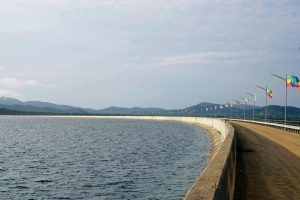CAIRO (AP) — Ethiopia claimed Monday that its recently inaugurated dam has helped lessen floods that have hit Sudan, as speculation rose over whether it has actually caused the deluges.
Sudan on Saturday issued a flood alert citing rising water levels along the Nile River’s two main tributaries, the Blue and White Nile. Sudanese authorities maintained the alert on Monday.
The Sudanese irrigation ministry said late Sunday that the water level has been high for four consecutive days as dams in the area discharged excess water. It urged residents in the provinces of Khartoum, River Nile, White Nile, Sennar and Blue Nile to remain vigilant as floods may affect agricultural lands and houses.
Water levels are expected to decrease throughout the week, Abbas Sharaky, a Professor of Geology and Water Resources at Cairo University, said on Monday.
Earlier this month, Ethiopia inaugurated the Grand Ethiopian Renaissance Dam, or GERD, Africa’s largest dam, to boost the economy. The nearly $5 billion dam, located on the Blue Nile near Ethiopia’s border with Sudan, will produce more than 5,000 megawatts and is expected to double Ethiopia’s electricity generation capacity, according to officials.
But some have accused the dam of causing the floods in Sudan.
“The situation is the result of a man-made error,” Sharaky told The Associated Press.
Although Sudan benefits from the dam’s water flow during the agricultural season, “the current situation is causing more harm than good because the harvest season has almost ended,” Sharaky said. He added that the GERD wasn’t emptied gradually as it stored water during Ethiopia’s rainy season between June and August, which also burdens the dam.
Four turbines that were supposed to help reduce the dam’s reservoir failed to operate, preventing Ethiopia from releasing excess water, which led to excessive water flow into Sudan this week, Sharaky said.
“Ethiopia was stubborn and has repeatedly said that the dam’s turbines are working, but seeing the stored water not decreasing says otherwise,” Sharaky said.
Ethiopia’s Water Minister Habtamu Itefa Geleta said Monday: “The flood in Sudan could be from White Nile. If GERD was not there, the magnitude could have been devastating. GERD played a significant role in reducing the catastrophic effect.”
When asked about the turbines not operating, the minister did not answer the question but acknowledged: “We did not release the excess water.”
Egypt says Ethiopia has consistently lacked the political will to reach a binding agreement on the dam, undermining the Nile River water rights of Egypt and Sudan.
On Sept. 4, before GERD’s inauguration, Tamim Khallaf, spokesperson to the Egyptian foreign ministry, said Ethiopia built the dam “unilaterally without any prior notification, proper consultations, or consensus with downstream countries, thereby constituting a grave violation of international law and posing an existential threat.”
___
Musabi reported from Nairobi, Kenya.
By FATMA KHALED and EVELYNE MUSAMBI
Associated Press

